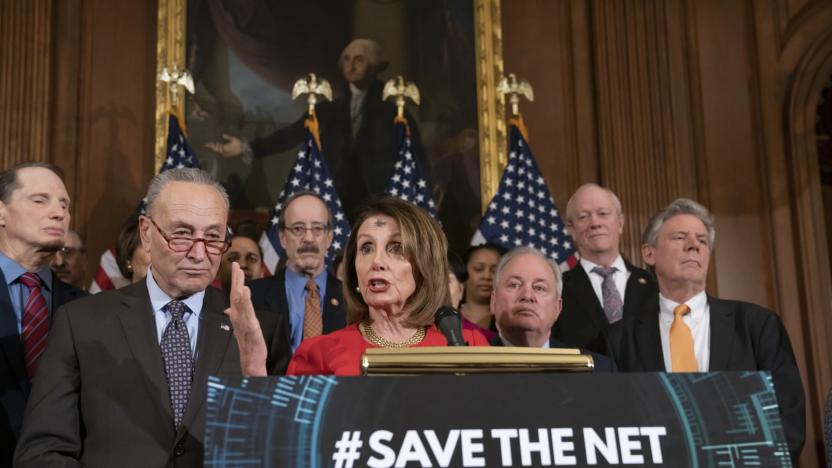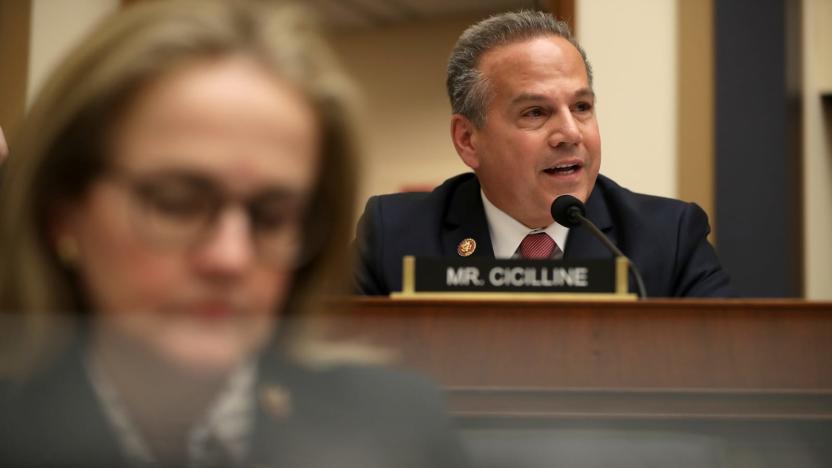House Of Representatives
Latest

House panel asks Apple, Google if app makers must reveal foreign ties
The US is growing increasingly suspicious of foreign-made apps. House national security subcommittee chairman Rep. Stephen Lynch has sent letters to Apple and Google asking whether or not they require app developers to disclose "potential overseas affiliations" before software shows up in their respective stores. The congressman is worried about claims that apps like TikTok, Grindr and FaceApp may be providing sensitive data to the governments of China and Russia.

Twitter bans House candidate who suggested Ilhan Omar should be hanged
Twitter may be reluctant to crack down on politicians' tweets, but it still has its limits -- and one political candidate may have crossed the line. The social media giant has permanently banned Republican House candidate Danielle Stella's personal and campaign accounts for "repeated violations" of Twitter's policies. While it didn't elaborate on what those violations were, Stella's campaign suggested that her potential rival, incumbent representative Ilhan Omar, should be "tried for #treason and hanged" if she was found to have passed sensitive info to Iran through Qatar. That claim is unsupported by evidence. The posts may have violated Twitter policies forbidding the promotion of violence or threats.

House passes controversial copyright bill that could be abused by trolls
Yesterday, the House of Representatives voted in favor (410-6) of a controversial copyright bill known as the Copyright Alternative in Small-Claims Enforcement Act of 2019, or CASE Act. The bill is meant to give independent creators an affordable and accessible way to defend their intellectual property. But critics question whether it is constitutional and argue that it could be abused by trolls, potentially bankrupting the creators it's meant to benefit.

Google, Reddit execs to speak at House hearing on internet moderation
American politicians have been questioning whether internet companies should be held liable for the content they allow, and two of those companies will soon address those concerns directly. Two House subcommittees are holding a joint online content moderation hearing on October 16th where Google IP policy head Katherine Oyama and Reddit CEO Steve Huffman (above) will speak as witnesses. The hearing will both explore existing practices and help determine if customers are "adequately protected under current laws," including the Communications Decency Act's Section 230 safe harbor protections.

Google faces scrutiny from Congress, DOJ over plans to encrypt DNS
Google's bid to encrypt domain name requests appears to be raising hackles among American officials. The Wall Street Journal has learned that the House Judiciary Committee is investigating Google's plans to implement DNS over HTTPS in Chrome, while the Justice Department has "recently received complaints" about the practice. While Google says it's pushing for adoption of the technology to prevent spying and spoofing, House investigators are worried this would give the internet giant an unfair advantage by denying access to users' data.

House committee asks 8chan owner to testify over extremist content
Politicians are still determined to investigate 8chan's role in fueling extremism even though the site is effectively out of commission. The House's Homeland Security Chairman Bennie Thompson and Ranking Member Mike Rogers have sent a letter to 8chan owner Jim Watkins asking him to testify about the site's efforts to "investigate and mitigate" the appearance of extremist content, including white supremacist material. The politicians were concerned that 8chan has been linked to three mass shootings in 2019 (Christchurch, Poway and El Paso), with the attackers reportedly posting letters or manifestos on the site shortly before committing the murders.

Amazon, Apple, Facebook and Google to testify in Congress on competition
The House committee investigating antitrust in tech is about to call some big names to the microphone. Aides for antitrust panel chairman Rep. David Cicilline have confirmed that the committee is holding a hearing on July 16th where it will question executives from Amazon, Apple, Google and Facebook. The exact focus of the questioning isn't clear, but it's likely to follow the basic competitive concerns that launched the investigation.

Bipartisan House bill aims to curb illegal robocalls
The US Senate has shown bipartisan support for a bill to crack down on robocalls, and now it's the House's turn. Energy and Commerce Committee Chairman Frank Pallone and Ranking Member Greg Walden have introduced a bipartisan Stopping Bad Robocalls Act that would similarly toughen requirements for carriers while more explicitly punishing spam callers. There are some key differences between the two, however.

Juul faces House investigation over teen e-cigarette use
Juul is facing even more heat over concerns that it's contributing to teen vaping. The House Subcommittee on Economic and Consumer Policy has opened an investigation into the "youth e-cigarette epidemic" that could determine if Juul had marketed its e-cigarettes to kids. Committee Chairman Raja Krishnamoorthi has asked the company to hand over any documents from 2013 onward that touch on related parts of its advertising and social media strategies, including the impact of ads on children and its awareness of under-18 social network followers.

House antitrust subcommittee will investigate internet competition
The US government is about to intensify its scrutiny of tech giants. The House Antitrust Subcommittee has launched a bipartisan investigation that will gauge the level of competition in online markets. It's concerned that a "handful of gatekeepers" have extensive control of the internet, and it wants to know if these companies are abusing their power or otherwise stifling others. Politicians will also determine whether or not existing antitrust laws, policies and enforcement are enough to correct behavior.

House of Representatives passes bill to restore net neutrality
The House of Representatives has passed a bill which would restore net neutrality rules the Federal Communications Commission repealed in 2017. Representatives approved the bill by 232-190 (with a sole Republican voting in favor), but the legislation still seems doomed.

House committee chair calls for FTC antitrust investigation into Facebook
Facebook is already under regulatory scrutiny in the US, but it could be subject to much more pressure if one House representative has his way. Antitrust subcommittee chairman Rep. David Cicilline has written an editorial in the New York Times calling on the FTC to investigate Facebook for potential antitrust violations. He's concerned that the social network not only leveraged its power to collect and share data through questionable means, but tried to "obstruct" overseers and "smear" critics while simultaneously engaging in "denial, hollow promises and apology campaigns" that accomplished little.

House chair asks tech CEOs to speak about New Zealand shooting response (updated)
Internet companies say they've been scrambling to remove video of the mass shooting in Christchurch, New Zealand, but US politicians are concerned they haven't been doing enough. The Chairman of the House Committee on Homeland Security, Bennie Thompson, has sent letters to the CEOs of Facebook, Microsoft, Twitter and YouTube asking them to brief the committee on their responses to the video on March 27th. Thompson was concerned the footage was still "widely available" on the internet giants' platforms, and that they "must do better."

'Gutted' NSA reform bill passes the House, but sheds supporters
It's not exactly what privacy advocates and most tech companies wanted, but it's something. The USA Freedom Act has passed through the House of Representatives, but it didn't escape unscathed. While many of the main components survived, other elements were lost to amendments or dramatically altered. One of the most controversial changes from the bill that passed out of the Judiciary Committee was a broader definition of a "specific selection term," which is used by the NSA to define their data requests. The original language allowed the government to ask for records relating to a "person, entity or account." What was passed by a vote of 303 to 12 on the floor of the capital added "address, or device" to that list, leaving the scope for data request quite broad. Obviously the original version of the bill had a much more narrow definition, which has led many privacy advocates like the Electronic Frontier Foundation (EFF) and tech companies like Google to drop support for the bill as they feel it leaves too much room for abuse.

Bill to end NSA's mass surveillance moves closer to a vote
The House Judiciary Committee is getting ready to begin mark up procedures on the USA Freedom Act, a bill that would effectively end the NSA's mass surveillance program as it exists today. Jim Sensenbrenner, a Wisconsin Republican, is the man behind the bill and he's got tons of backing from the tech and privacy communities. That support probably has something to do with the alternative bill currently with the House Intelligence Committee which many agree doesn't do enough to rein in the NSA. In an effort to get it through committee with its teeth intact a slew of nonprofits and major companies, including the ACLU, the Electronic Frontier Foundation, DropBox, Mozilla and Reddit have signed a letter to its members stating their support. Plus there are 140 co-sponsors in the House and a sister bill working its way through the Senate with the support of Patrick Leahy, the Democratic chair of the Senate Judiciary Committee.

Google testifies before House of Representatives, calls for updated email privacy laws
Google's legal director of law enforcement and information security, Richard Salgado, is set to testify before the US House of Representatives this morning about the need for new email privacy legislation. In his written testimony, Salgado notes that the 1986 ECPA (Electronic Communications Privacy Act) doesn't reflect the internet circa 2013, noting how cloud computing has increased the amount of user information shared and stored online. Salgado's prepared statement calls for updates to ECPA that allow for greater privacy measures, while also ensuring that government agencies can obtain access to documents when necessary. He points to the ECPA's policy on government requests to view users' email -- only a subpoena is required for email 180 days or older, but viewing newer communication requires a search warrant -- as an example of the law's "inconsistent, confusing and uncertain standards." Google wants to alter the ECPA to require search warrants to access any user data stored online, regardless of their age. Salgado's testimony also touches on Mountain View's own efforts to improve transparency when it comes to user privacy, including publishing reports about government requests. Read the statement in full via the source link below.

House bill proposes fines on retail games without ESRB ratings, prohibition of some sales to minors
Bill H.R.287, or the "Video Games Ratings Enforcement Act" as it will likely be more widely known, seeks to accomplish three goals: To make illegal the act of selling or renting video games that have not been evaluated by the ESRB, to legally prohibit the sale of Adults Only/Mature games to anyone under the age of 18/17 respectively, and to institute a fine not in excess of $5,000 in the event of noncompliance.The bill's second and third provisions aside, mandating that all games be rated doesn't sound too wildly outside the scope of reason, save for the fact that the industry's current architecture supports that already. Granted, indie games that end up on Steam or other PC/Mac distribution platforms may not seek out ESRB evaluation, but any game released for any console must have an ESRB rating, as Nintendo/Sony/Microsoft will refuse licensing otherwise.If the rest of what VGREA is attempting to accomplish sounds familiar, it's because the Supreme Court of the United States already declared such legislation unconstitutional way back in June of 2011. So, unless time is cyclical and this bill is actually what the court ruled on in 2011, the chances of this new one getting off the ground are pretty slim.

Events 2012: SOPA
The Stop Online Piracy Act, had it been successfully enacted, would have given US law enforcement agencies the ability to legally bar search engines from linking to websites that were deemed to host copyright-violating content (whatever that may be), provided said agencies were able to obtain a court order.It also would have given law enforcement the ability to bar advertisers and e-commerce payment providers from doing business with offending websites, but the bill's real party peace was its ability to block access to infringing websites at the ISP level.If you think that sounds oddly familiar, that's because it's essentially what The Patriots were trying to accomplish in Metal Gear Solid 2, although the bill's less clandestine methodology wouldn't have required the construction of a massive submersible aquatic fortress. As troubling as all that sounds, internet legislation isn't really in our wheelhouse since we're a video game website and everything. Once Nintendo, Sony and EA all put their weight behind the bill, however, the issue suddenly fell under our jurisdiction and became much more complicated, especially once Microsoft, Apple and a consortium of other tech giants expressed their support. Of course, anything that threatens the Internet's right to free speech is swiftly met by the razor-sharp blade of e-activism, with the whole of the Internet collapsing into a singularity of outrage aimed directly at the companies in support of the bill. As public objection grew, Microsoft, Apple and the other members of the Business Software Alliance rescinded their support almost immediately. Nintendo, Sony and EA followed suit shortly thereafter, though the ESA (of which they are all members) remained in support of SOPA. Rep. Lamar Smith (who had originally authored the bill) eventually announced that he was removing the DNS-blocking portions of the legislation, making the proposed bill somewhat less insane, but still plenty dangerous. Shortly thereafter, House Oversight Committee chairman Darrell Issa cancelled a scheduled hearing and indefinitely postponed voting on SOPA, effectively placing the bill into a state of suspended animation. A similar hold was placed on SOPA's Senate sister PIPA, which sought to accomplish the same goals. It was not until both pieces of legislation had effectively been killed that ESA withdrew its support.

Apple does not plan to appear before Australian price inquiry
Apple is in hot water in Australia for refusing to appear in front of a House of Representatives inquiry into retail pricing, says stuff.co.nz. A report by the House of Representatives standing committee on infrastructure and communications claims Apple (and other tech companies like Microsoft) charge significantly more for products in Australia than they do for the same products in the US. The committee wants to know why this pricing disparity exists and has asked Apple for an explanation. The Cupertino company handed over a confidential submission, but the confidentiality clause prevented the committee from using this information in its report. Apple has also refused to appear at the committee's hearings. "Apple has made the utterly wrong call, bringing down the shutters and refusing to engage with this inquiry,'' said Labor MP and committee member Ed Husic. "They're making it difficult for the committee to do its work and it's a massive double standard." This double standard is a reference to Apple's attendance at past US Congressional hearings. Apple's refusal to attend has prompted the members to discuss whether it can legally force the company to attend the hearings. #next_pages_container { width: 5px; hight: 5px; position: absolute; top: -100px; left: -100px; z-index: 2147483647 !important; }

SOPA: Who's in and who's out?
By now we're sure you're aware that SOPA is more than just a tomato-based noodle soup. The Stop Online Piracy Act's been stirring controversy with its intentions, and it'll most likely continue in this path until we hear a final decision. Go Daddy wasn't shy -- before retracting -- about its support for the bill, and things have changed drastically since we first heard some of the "top dogs" express their feelings. But who else is behind it, who's got your back, and who's had a change of heart? The answers await you after the break.







